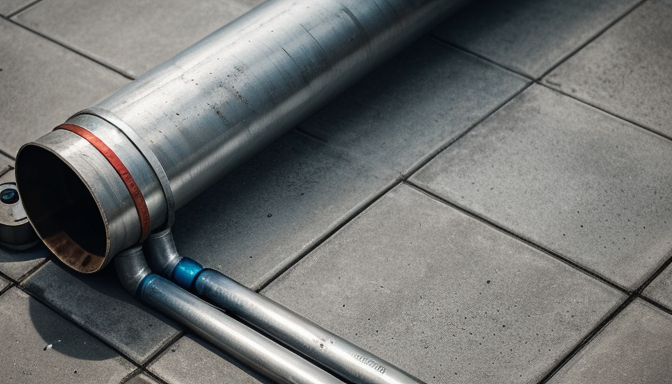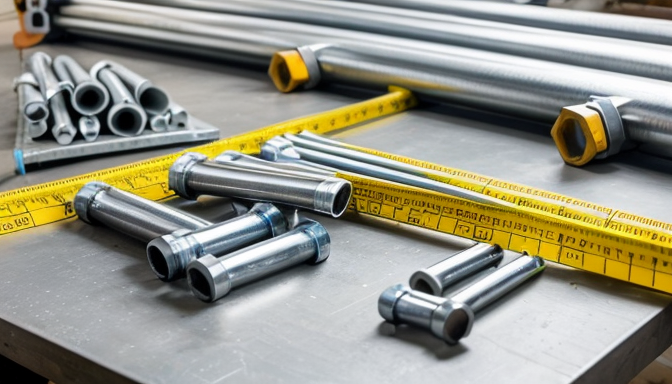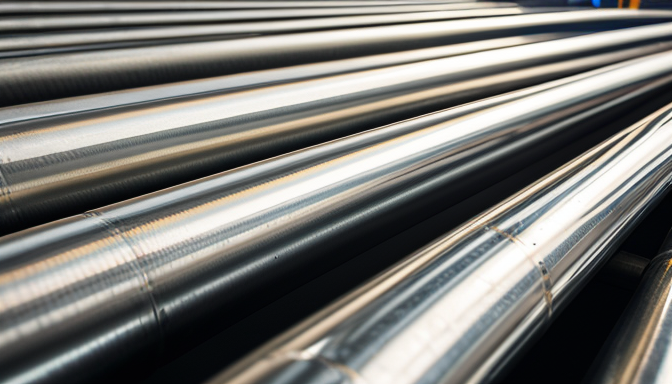When it comes to plumbing, steel plumbing pipes are a popular choice among builders and homeowners alike. But why is that? Well, these pipes are not just ordinary tubes; they offer a blend of strength, durability, and reliability that is hard to beat. Imagine a sturdy bridge made of steel—it’s built to last, right? That’s exactly what steel pipes bring to your plumbing system.
Steel pipes are often considered the backbone of plumbing systems in both residential and commercial settings. They can handle high pressure and are resistant to many of the wear and tear factors that can plague other materials. Think about it: when you’re dealing with water, you want something that won’t crack or break under pressure. Steel pipes do just that!
Now, let’s dive into a few key aspects of steel plumbing pipes that make them stand out:
- Price: Understanding the cost factors associated with steel plumbing pipes is crucial for budget planning in construction projects.
- Weight: The weight of these pipes can impact installation and transportation, making it essential to know what you’re working with.
- Properties: Steel pipes offer unique properties such as durability and resistance to corrosion.
- Sizes: They come in various sizes to accommodate different plumbing needs.
But let’s not get lost in the technicalities. The real question is: how do these pipes fit into your life? If you’re renovating your bathroom or building a new home, you want materials that will last. Steel plumbing pipes can last for decades, which means fewer headaches for you in the long run. Nobody wants to deal with a leaky pipe at 2 AM, right?
Whether you’re a DIY enthusiast or a professional contractor, knowing about steel plumbing pipes can save you time and money. Imagine finishing a project only to realize the pipes you used won’t hold up. That’s a nightmare scenario! By choosing steel, you’re opting for a material that has been trusted for years.
In summary, steel plumbing pipes are more than just a choice; they are a smart investment for anyone looking to ensure quality and longevity in their plumbing systems. So, the next time you’re planning a plumbing project, think about the strength and reliability that steel can provide. After all, a solid foundation starts with the right materials!
Steel Plumbing Pipe Price
Understanding the cost factors associated with steel plumbing pipes is crucial for budget planning in construction projects. Prices can vary significantly based on several elements. For instance, the quality of the material plays a huge role. Higher quality steel often means a higher price tag. But is it worth it? Absolutely! Quality pipes can save you from costly repairs down the road.
Another factor influencing price is the size of the pipe. Larger pipes require more material and thus cost more. To give you a clearer picture, here’s a simple breakdown:
| Pipe Size (inches) | Price Range (per foot) |
|---|---|
| 1/2 | $1.50 – $3.00 |
| 3/4 | $2.00 – $4.00 |
| 1 | $3.00 – $5.00 |
| 2 | $5.00 – $10.00 |
Market demand also plays a significant role in pricing. When demand is high, prices tend to rise. It’s like any other product; when people want it, the cost goes up. So, if you’re planning a project, it’s smart to shop around. Compare prices from different suppliers. You might be surprised at how much you can save!
Also, consider the location of your purchase. Local suppliers may offer better prices than larger chains. Plus, buying locally can reduce shipping costs. And let’s face it, every penny counts when you’re on a budget.
In summary, while the price of steel plumbing pipes can vary, being informed about the factors that influence these prices can help you make better purchasing decisions. Always weigh your options and remember: investing in quality now can save you money in the future. After all, no one wants to deal with leaks or burst pipes!

Steel Plumbing Pipe Weight
When it comes to steel plumbing pipes, understanding their weight is more than just a number. It’s about making informed decisions for your construction or plumbing projects. Why does weight matter? Well, it affects everything from transportation to installation. If you choose a pipe that’s too heavy for your setup, you might find yourself in a bit of a pickle!
Let’s dive into some specifics. Steel pipes are known for their robustness, but this also means they can be quite heavy. For instance, a standard 1-inch steel pipe can weigh around 1.68 pounds per foot. That might not sound like much, but when you’re dealing with long runs of piping, the weight can add up quickly. Imagine carrying several lengths of these pipes on-site—it’s no walk in the park!
Here’s a quick breakdown of typical weights for different sizes of steel plumbing pipes:
| Pipe Size (inches) | Weight (lbs/ft) |
|---|---|
| 1/2 | 0.84 |
| 3/4 | 1.50 |
| 1 | 1.68 |
| 1.5 | 2.27 |
| 2 | 3.65 |
As you can see, the weight increases with the size of the pipe. This is crucial for planning your project. Heavier pipes may require additional support during installation. Plus, think about the logistics. If you have a truckload of heavy pipes, you’ll need the right equipment to handle them safely.
In addition, the weight affects how the pipes perform under pressure. Heavier pipes tend to be more stable, which is great for high-pressure systems. However, if you’re working in a residential setting, you might want to balance weight with ease of installation. It’s like choosing between a sturdy backpack and a lightweight one for hiking—both have their pros and cons!
So, when selecting your steel plumbing pipes, don’t just focus on the cost or size. Take a moment to consider the weight. It can make a significant difference in your project’s success. After all, you want your plumbing system to be reliable and efficient, right?
Steel Plumbing Pipe Properties
When it comes to plumbing systems, the choice of materials can make or break the entire setup. Steel plumbing pipes stand out due to their unique properties. First and foremost, they are known for their durability. Unlike plastic or other materials, steel can withstand extreme temperatures and pressures. This means fewer leaks and less maintenance over time.
Another significant property is corrosion resistance. While steel is susceptible to rust, modern advancements have led to the development of galvanized steel pipes. These pipes are coated with a layer of zinc, providing an extra defense against corrosion. This feature is especially important in areas with high moisture or where the water supply may contain corrosive elements.
Moreover, steel pipes are flexible in terms of application. They can be used for both residential and commercial plumbing systems. Whether you’re installing a new water line or setting up a gas line, steel pipes can handle the job. Their strength ensures that they can endure heavy-duty applications, making them a favorite among contractors.
Let’s not forget about the thermal conductivity of steel. This means that heat transfer is efficient, which can be a boon for heating systems. Imagine a chilly winter morning where your heating system kicks in quickly. That’s the kind of efficiency you get with steel pipes!
To give you a clearer picture, here’s a quick overview of some of the properties of steel plumbing pipes:
| Property | Description |
|---|---|
| Durability | Can withstand high pressure and extreme temperatures. |
| Corrosion Resistance | Galvanized options available to prevent rust. |
| Flexibility | Suitable for various plumbing applications. |
| Thermal Conductivity | Efficient heat transfer for heating systems. |
In summary, the properties of steel plumbing pipes make them a reliable choice for any plumbing project. Their durability, resistance to corrosion, and versatility ensure that they can meet the demands of both residential and commercial applications. So, next time you’re considering materials for a plumbing job, remember the strength and reliability that steel brings to the table!

Steel Plumbing Pipe Sizes
When it comes to steel plumbing pipes, size truly matters. Choosing the right size is crucial for ensuring that your plumbing system functions properly. Think of it like choosing the right size of shoes; if they’re too big or too small, they just won’t fit right. Steel plumbing pipes are available in a variety of sizes, which can be a bit overwhelming at first. But don’t worry, I’ll help break it down for you.
Generally, steel pipes are measured by their nominal pipe size (NPS), which indicates the diameter of the pipe. Here’s a quick rundown of the common sizes you might encounter:
| Nominal Pipe Size (NPS) | Outer Diameter (OD) in inches | Typical Applications |
|---|---|---|
| 1/2″ | 0.840″ | Residential plumbing, gas lines |
| 3/4″ | 1.050″ | Water supply lines, heating systems |
| 1″ | 1.315″ | Industrial applications, larger plumbing systems |
| 2″ | 2.375″ | Main water lines, drainage |
These sizes are just the tip of the iceberg. Depending on your project, you might need anything from a small 1/2″ pipe for a simple home repair to a hefty 2″ pipe for more extensive plumbing systems. The choice really depends on the flow rate you need and the specific requirements of your plumbing setup.
But wait, there’s more! Steel pipes are also available in different wall thicknesses, known as schedule. Common schedules include Schedule 40 and Schedule 80, with Schedule 80 being thicker and better suited for high-pressure applications. This means that if you’re dealing with something like a commercial plumbing system, you might lean towards Schedule 80 for added durability.
In summary, understanding the sizes and specifications of steel plumbing pipes is essential. It’s not just about picking a pipe and hoping for the best. You need to consider the purpose, flow rate, and even the environment in which the pipe will be installed. So, the next time you’re in the hardware store, take a moment to think about the size and type of pipe you really need. It could save you time, money, and a lot of headaches down the line!
Frequently Asked Questions
- What are the main advantages of using steel plumbing pipes?
Steel plumbing pipes are renowned for their durability and strength. They can withstand high pressures and are resistant to impacts, making them ideal for both residential and commercial applications. Additionally, their corrosion resistance ensures a longer lifespan, reducing the need for frequent replacements.
- How do I determine the right size of steel plumbing pipe for my project?
Choosing the right size involves understanding your plumbing system’s requirements. It’s essential to consider factors like water flow rate and pressure. Generally, larger pipes are better for high flow, while smaller pipes suffice for low flow applications. Consulting with a plumbing professional can help you make the best choice.
- What factors influence the price of steel plumbing pipes?
The price of steel plumbing pipes can vary based on several factors, including the quality of the steel, pipe diameter, and length. Market demand and the supplier’s location also play a significant role. It’s wise to compare prices from different suppliers to find the best deal.
- Are steel plumbing pipes suitable for all types of plumbing applications?
While steel pipes are versatile, they are not always the best choice for every application. They work well in high-pressure systems and industrial settings but may not be ideal for areas prone to corrosion, such as in coastal regions. In such cases, alternatives like PVC or copper might be more suitable.
- How heavy are steel plumbing pipes compared to other materials?
Steel plumbing pipes tend to be heavier than alternatives like PVC or PEX. This weight can affect installation and transportation. For example, a standard steel pipe can weigh significantly more than a plastic counterpart, so it’s crucial to consider this when planning your project.
- Can I install steel plumbing pipes myself?
While DIY enthusiasts may be tempted to take on the installation of steel plumbing pipes, it’s essential to have the right tools and knowledge. Improper installation can lead to leaks and other issues. If you’re unsure, hiring a professional plumber is often the safest bet.
